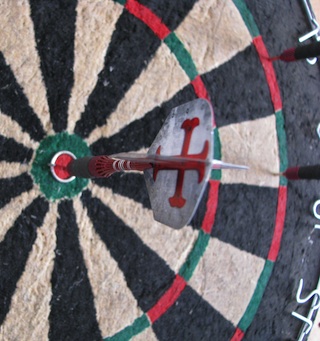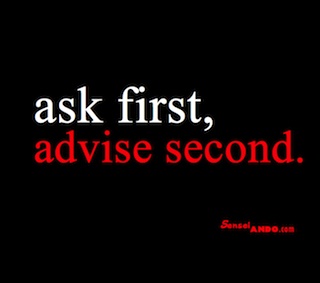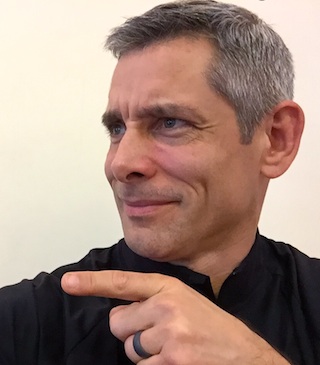Good advice is like gold—valuable, but hard to find. Bad advice is like dirt… or manure. It’s everywhere and stinks. Which is why I hate practicing martial arts in front of other people.
I hate practicing in front of other people because there’s always somebody with something to say. Yes, once in a while, someone will ask, “Are you doing Kung Fu? Cool! I’ve always wanted to do Kung Fu!”
I love that person. Unfortunately, that’s not who usually approaches me. Usually, it’s a critic—a crazy critic. Example…
 I was working out at a football field. The stadium was empty except for one middle-aged guy jogging around the track. Still, not taking any chances, I moved behind the bleachers so I wouldn’t attract his attention…
I was working out at a football field. The stadium was empty except for one middle-aged guy jogging around the track. Still, not taking any chances, I moved behind the bleachers so I wouldn’t attract his attention…
It didn’t work. Out of the corner of my eye, I saw the guy stop jogging and walking across the field in my direction.
I knew what he was going to say. Sure enough, he called over—
“Hey—you’re doing that wrong.”
No “hello”. No “how’s it going”? Just walked up and punched me in the face with a critique.
Now, I’m not saying this guy was evil. I’m sure he meant well. Which is why, when I get sucker punched with advice, my reaction is always the same—
Smile… nod… take the criticism… say thank you.
In this case, the fellow told me that when I do an upward block, I have to step out of the way in case I miss.
What he didn’t know, what he couldn’t see, was that I wasn’t practicing upward blocks! That’s just what he thinks he saw.
Because he didn’t know what I was doing, his advice was completely worthless and a waste of time.
The same thing happens at the gym. Even when I purposely train at off-hours… even when I purposely wait for everyone to clear out so I can be alone… once I start working the bags, out of the corner of my eye, here comes another critic—
“Hey—you’re doing that wrong.”
The critics have told me to turn my hand when I punch. Or add more snap. Or raise my shoulder.
Good advice? Sure… if I was punching!
But what they didn’t know, what they couldn’t see, is that I wasn’t punching. It just looked like a punch.
Now, don’t get me wrong… I love advice. I want advice. I pay good money for advice. I drive across town for advice. But there’s a big difference between good advice and bad advice. Between smart, constructive criticism and meaningless, mean-spirited criticism.
Unfortunately, the world—and definitely the world of martial arts—is filled with crazy critics. I talked about this in Karate Is Stupid and Other Ignorant Comments.
- Tai Chi? Too slow.
- Aikido? Unrealistic.
- Tae Kwon Do? Too fancy.
- BJJ? Get off the ground.
- Systema? What—that crazy Russian spy stuff?
In the world of martial arts, making fun of other styles is as common as bowing. But it goes deeper than that. Even within your own style and within your own school, I’ll bet you’re hit with empty criticism and bad advice.
Example 1. You’re practicing a kata or a drill. Your teacher gives you a correction. Maybe he or she tells you to slow down and make your movements flow into one another.
So, you practice your moves slower and with more flow. Your teacher sees this and walks over, but instead of saying, “Good job!” tells you, “You’re too slow. Your techniques should snap.”
You nod with a smile, but secretly, you’re thinking, “Snap? I’m only moving slowly because you told me to! Make up your mind!”
Example 2. You’re sparring. Your partner stops and says, “Hey—use your kicks. I keep giving you openings and you never take them.”
You nod with a smile, but secretly, you’re thinking, “I’m not working on kicks right now, I’m working on punches. In fact, I’m trying NOT to throw kicks. And by the way, you’re not that great, either, so how about you just focus on you and I’ll focus on me. Okay, hotshot?”
Again, I’m not saying your teachers and fellow students are jerks. They want to help. Yes, sometimes they may give you advice just to boost their own ego or to remind you that they’re your senior, but that’s okay!

If an egomaniac gives me good advice, that’s a win-win situation—I learn and they feel important. The trouble starts when their advice misses the mark. Or makes no sense. Or doesn’t apply to you.
When that happens, their bad advice might make them feel better, but it only makes you want to strangle them with their own belt.
So, that raises the question—what’s the difference between a smart critic and a crazy critic? Simple…
The crazy critic gives you advice before knowing what you’re doing or why you’re doing it.
They shoot without aiming. Which makes about as much sense as throwing a life jacket to someone standing in the desert. Or jumping on someone’s chest when they fall asleep and administering CPR.
In the words of Max Bialystock, “Don’t help me!”
Sadly, there’s no solution for stopping people from giving you bad advice… although training alone in the basement with the lights off is a good start. But can we stop ourselves from being a crazy critic?
Can you be sure that you’re giving good advice when you’re the teacher, when you’re the training partner, when you’re the stranger walking up to make a comment, when you’re the outsider looking through the window of another school?
Yes!
How to Give Good Advice
Here are two challenges to help make you a smart critic. If you accept them, I think you’ll find yourself saving time, growing smarter, helping others, and building a happier life. If you don’t… then you must be crazy!
Challenge #1: If you want to give good advice, ask first, advise second.
That’s it. Aim before you shoot.
Understand that when you begin a conversation with a statement or an opinion, you’re presuming that you see everything there is to see. You lock yourself into viewing life through a filter of your own making. You repeat what you already know. But the fact is—
You can’t see everything. You don’t know everything.
Think of all the different martial arts techniques you could possibly practice…
Now multiply those techniques by the myriad of ways you could practice them…
Now multiply that number by all the different body types, personalities, training goals, and training levels of all students.
 You end up with a mind-boggling web of possibilities, right? So, how can anyone presume to know what someone else is doing?
You end up with a mind-boggling web of possibilities, right? So, how can anyone presume to know what someone else is doing?
Maybe that punch is actually a sweep. Maybe that person is working on their back foot while you’re watching their front foot. Maybe that person has an injury.
You don’t know! And you’ll never know, or see life clearly, or learn anything new, if you don’t ask a question first.
The funny thing is that when critics gives me bad advice, they don’t even realize that they’re the ones missing out on the opportunity to learn something new or at least see something from a new perspective. They’re so busy telling me what they think, that they don’t get a chance to hear what I think.
No, I’m not saying that every thought in my head is worth hearing, but they’ll never find out if they don’t give me a chance to speak.
So, the next time you want to give advice to someone, STOP.
Is it possible there you’re not seeing the whole picture? Can you enter into a conversation seeking information before sharing information? Will you allow humility to lead you to the possibility of learning something new?
All you have to say is, “What are you doing?” Or, “It looks like you’re working on your punches… am I right?”
That’s how you avoid becoming a crazy critic. Ask first, advise second.
Challenge #2: Stop criticizing… period!
Okay, that’s ridiculous. Criticizing is as natural as breathing! I mean, if stopping criticism is the mark of spiritual enlightenment, then I will die a fool.
So, how about a more realistic challenge? I’ve got one.
But first, can we agree that the vast majority of our critical thoughts are a complete waste of time and energy? You hate this, dislike that, find that man’s voice annoying, can’t understand why she wears those clothes, and on and on and on. It’s a bunch of noise!
Here’s an example of criticism at its noisiest and most worthless…
I mailed a letter the other day. As it happens, the mailbox in my neighborhood is located right in front of a doughnut shop.
 As I hopped back in my car, an SUV pulled up and parked next to me. A heavyset woman stepped out and headed into the doughnut shop. I’m not calling her “heavyset” to be mean, it happens to be a fact.
As I hopped back in my car, an SUV pulled up and parked next to me. A heavyset woman stepped out and headed into the doughnut shop. I’m not calling her “heavyset” to be mean, it happens to be a fact.
The point is, when I saw her walk into the doughnut shop, I mumbled to myself, “Come on, lady… you don’t need a doughnut.”
I’m not proud of that… but I am shocked! Shocked because the words fell out of my mouth without even thinking, which means either my brain is wired, or has been trained, to criticize all by itself.
And this was worthless criticism! It served no one.
Did my criticism help the woman? No. Did it help me? No. So, what was the point?
There was no point! It was just noise.
Unfortunately, I don’t think it’s possible to turn off that noise. We’re critical creatures… which is not always a bad thing.
But if we can’t stop the noise, can we find a way to turn all of that meaningless, negative criticism into constructive, good advice?
Yes!
Challenge #2 (Revised): When you criticize others, criticize yourself, too.
For example, after I criticized the heavyset woman for buying a doughnut, I immediately considered my own diet. It wasn’t pretty…
 Believe it or not, that same day—only a couple of hours earlier—I had eaten half a cherry pie for breakfast.
Believe it or not, that same day—only a couple of hours earlier—I had eaten half a cherry pie for breakfast.
Yup. Not just any pie… a good pie. A $24 pie! I ate the whole thing in less than 24 hours.
So, really, who the heck am I to sneer at a woman I don’t even know for eating a doughnut? That’s hypocritical and ridiculous.
True, I’m not overweight, but there’s nothing healthy about eating a whole pie! I was asking my body to process more junk than she was.
When I realized that, I scolded myself and made a promise to not binge on pies anymore. I also made a promise to spend my money more wisely. I mean, $24 for a pie?
Will those promises last forever? Probably not. But for the next week, I cleaned up my act and led a healthier life.
That’s how we can turn snark into strategy… gossip into good advice.
The moment you shake your head at the guy who lights up a cigarette, STOP. Think about your own breathing. Have you taken a deep breath today?
The moment you shout at the driver who cuts you off in traffic, STOP. Think about your own driving. Are you paying attention or are you distracted by your phone?
The moment you raise an eyebrow at that lazy co-worker, STOP. Think about your own work habits. Are you making the most of your time?
The moment you smirk at that guy in class who throws sloppy side kicks, STOP. Think about your own techniques. Isn’t there something you can improve?
It’s a sad fact that we often make ourselves feel better by pointing out the flaws in others. But when you turn that sharp, critical eye back on yourself, you might discover something interesting—what you criticize most in others is often what disappoints you most about yourself.
Maybe all that criticism isn’t just noise. Maybe it’s you screaming advice at YOU!
If that’s true, then let me ask…
Are you ready to listen to your own advice? Are you ready to take aim at yourself and attack the flaws that bother you so much when you see them in other people?
If you are, then seek to see things clearly. Seek to hear yourself honestly.
That’s how you turn bad advice into good advice. Empty criticism into life-changing wisdom. That’s how you become a wise teacher instead of a crazy critic.
This article is a summary of Episode #39 of the Fight for a Happy Life podcast, The Crazy Critic.

I’ve always considered myself an introvert which is the main reason I never joined a dojo as a kid (no such thing as MMA gyms in the 1950s) so it was refreshing to hear that, even with your years of experience, you dislike training in public as well. Hell, I’m even embarrassed during my private sessions! And as far as giving advice, never assume. You know what happens when you do…
Ha! “I’m even embarrassed during my private sessions!”
The only distinction I should make is the difference between a fear of criticism and the loathing of empty criticism. It’s obviously empowering to be able to do your thing and not care who’s watching. Once you can do that, then it’s okay to go back to the cave! 🙂
Thanks for the good advice Sensei! !
Thanks for reading, Miss Lynne! But please don’t ever give me any advice again! 🙂
Hi Sensei Ando, I really enjoyed your article. I made a sad mistake last year, when one of my sensei’s friends asked me to read something he’d written about his martial art, and give him “really detailed, constructive criticism on how to improve it” – he kept repeating this. I don’t know him that well but was happy to help, and spent ages reading through (it was long!) and thinking of some ideas to help him, especially with the structure.
But he didn’t even reply to my email, after all that effort! At first I was hurt and confused, But then I realised I had judged it completely wrong. I now believe he was just showing up as a vulnerable individual, who simply wanted someone to enjoy and praise his work. I spoke to a couple of friends about this – they agreed that even when people ask you directly for “really honest feedback” they actually often don’t mean it, and are actually just hungry for praise and recognition. I think people’s capacity for taking criticism without sustaining hurt can often be absolutely tiny, which makes your advice(!) to be careful with giving advice all the more important . . .
Hi Kai! I’d say you’re right… “people’s capacity for taking criticism without sustaining hurt can often be absolutely tiny.” It took me years to figure out that even when people talk about their problems, they don’t necessarily want solutions. Unfortunately, as a teacher or a friend, we want to guide, inspire, and provide solutions!
That’s where listening comes in. Not just listening for problems, but listening for feelings. Instead of asking, “How can I help,” I can ask, “What do you want?” If I can give you what you want first, then I’ll have a better chance at offering what I think you need. Meet them where they are! Thanks for the insight! 🙂
Hi Ando Sensei
As a complete beginner I realise that I am not the ideal person to give advice since I simply don’t have the experience nor the knowledge of techniques and their uses.
That being said I have always believed that good advice can come from anywhere sometimes even from the unlikeliest of sources.
It’s not like I’m just going to go and tell a black belt that his kicks are sloppy however if someone has a problem and a solution or possible way to help occurs to me wouldn’t it be better for me to tell that person regardless of difference in experience?
For example in training last week we finished with some friendly team sparring (captains pick people to oppose each other and then the team with the most victories wins).
During one of the matches a red belt on my team happened by chance to be paired with a blackbelt from theirs (both participants were about 12 or 13).
Anyway our red belt kept trying to do a spin kick that he had recently been taught but was unable to get close to hitting his opponent (not all that surprising given the difference in experience). At the end of the match he comes back and sits next to me moaning about how that particular kick is too slow so his opponents always block or dodge it.
At the time it occured to me that I have had a similar problem with my sidekicks which I feel I have solved by using them either as an opening technique in a sequence, or after throwing a couple of faster techniques first to try to disguise the kick or throw them off balance.
I told him as much and he seemed to think about it a bit and then we quieted down to watch the rest of the matches.
I have read the article a couple of times and I feel like I obeyed the 2 rules since I knew what his problem was and there was no criticism implied or otherwise.
I suppose what I’m wondering is whether you need to be qualified to give advice? There is no way I could perform the kick myself since my balance and control are not good enough, does that mean that I can’t advise someone on it’s possible uses? Is it ok for a lower belt to advise a higher one or does that come across as arrogant and self important? Should I keep thoughts to myself even if I think they could help the other person?
I know it’s a lot of questions but your articles are so thought provoking I keep coming up with them.
Wow, Andy! I think you broke the longest comment record! I should get a hat made for you or something. 🙂
I don’t think it’s out of line to offer advice to anyone willing to listen. A higher rank doesn’t mean they are better and knowledgeable about ALL things. Some people pick up certain moves or concepts sooner than others. Nothing wrong with sharing our wisdom with each other. If someone has too much ego to take advantage of that, it’s their loss.
If you’re not sure if your comment will be welcome, you can also try leading questions. In your case, maybe something like, “How do you think they see the kick coming?” “The kick looks good, but is there a different way to set that up?”
Just knowing you’re sensitive to the protocols of your school and the feelings of your fellow students tells me you’re a good guy. I hope you are rewarded with quality feedback from your fellow students! Thanks for the question! Stay in touch! 🙂
Thanks Sensei
Believe it or not that was the short version lol, I rewrote that comment 4 times before I eventually settled for that version (I think I might have put a bit too much detail in but I didn’t want to leave out anything that might be important) 🙂
I appreciate that, sir. Especially since I get comments like, “u suk”. So, thanks! 🙂
Well I think you’re awesome so I hope you ignore all of those idiot comments 😉
Thanks! That makes it much easier! 🙂